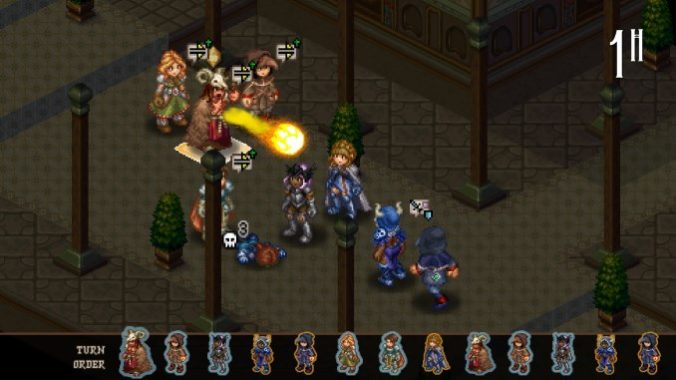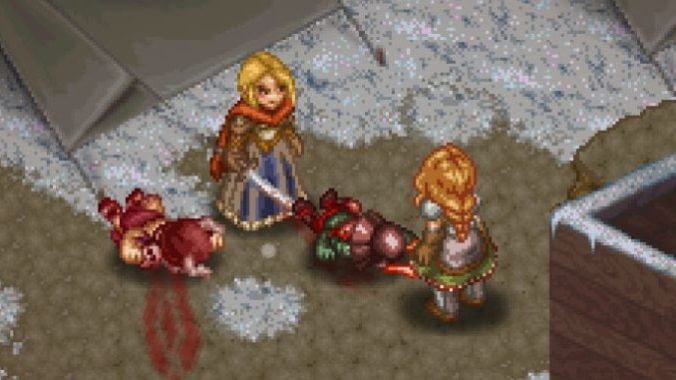Arcadian Atlas is first and foremost an homage. Depending on who you are, that may entice you to play it or wave you off of the notion entirely. It’s a bit of a double-edged sword: it rules to have a game that so clearly honors its biggest inspirations, beloved strategy role-playing games like Tactics Ogre: Let Us Cling Together and Final Fantasy Tactics, but I also wish it did something of its own. Over the years, tactics games have broadened what they do and focus on, allowing them to cultivate identities and unique strengths, like the Fire Emblem series’ renewed focus on intimate stories between characters. Others, like the sometimes brutal Banner Saga titles, have prioritized difficulty to push players to strategize like actual tacticians just to scrape by. The thing about being an homage is you have to strike that balance between the old and new, otherwise it feels like you’re lacking an identity of your own, which is precisely Arcadian Atlas’ problem. Arcadian Atlas kind of settles for something partway between several of these directions, never fully committing to any one path, and certainly bringing little else to help define it. And so it settles for being a half-decent tactics game and entry point that anyone can pick up and play, but folks hoping it might cut a little deeper will be left wanting.
In action, you’d be excused for thinking Arcadian Atlas was some kind of follow-up or modern remake of Final Fantasy Tactics. A lot of the former’s art direction and UI clearly takes notes from the latter, and Arcadian Atlas’ battles and maps are reminiscent of the tighter scale of FFT. You’ll stop into taverns on the world map to hear chatter about the world of Arcadia and collect side jobs that net you XP, gear and cash, which you can then spend on recruiting units and equipment at an outfitter. You’ll level up between encounters—though the game does a poor job of notifying you of this, it just more or less happens in the background—prompting players to invest in skill trees for characters divided into typical fantasy classes. These include one-handed and two-handed cavaliers—like the main characters, a couple named Vashti and Desmond—as well as rangers that include a raccoon named Poncho who magically gains sentience and a deadeye, and apothecaries like Eda, who slings potions and bombs in equal measure. Eventually, these classes have the chance to evolve into one of two advanced classes, each of which contain specializations such as the shaman’s split between the healing cosmic overseer branch and darker paths branch, which turns them into a sort of necromancer, but not entirely because those are bad (more on that in a bit).

If that all sounds familiar to players, it’s because it’s been done before. It’s all directly from the games that inspired Arcadian Atlas, with next to no supplements or wrinkles from the developers. On one hand, it’s great to have these systems intact once again, as they’re great, but their presence absent any modification or tweak cheapens the experience. There’s a handful (maybe less, honestly) of times where the game prompts players to make a decision that’s supposed to impact the story, but it rarely evolves the formula or immediate situation. Beyond that, playing the game extensively reveals a fatal flaw in the design: you can brute force your way through most encounters without thinking much about placement, team synergies, and the perfect deployment of abilities. It’s a tactics game that rarely asks you to employ any. Environments and topography don’t seem to affect battle in any way, rendering most of Arcadian Atlas‘ beautiful arenas into set dressing. There are status effects you can cleverly take advantage of, but why would you go to the work of plotting out complex chains of actions when so many of your projectiles can be given a noxious (poison) effect that does 90% of the work? It’s a diet-SRPG, primarily modeled after its ilk in form more than it is in function. The one thing the game does that actually sets it apart is feature an infectious jazz soundtrack, which unfortunately feels marred and let down by a game that can’t quite match the energy of its horns.
Having its edges sanded down so extensively deeply hurts Arcadian Atlas because richer systems and a more challenging design ethos might’ve bolstered the game to some greater heights in spite of its story, which clumsily navigates a war ripping a country and relationship apart. We’re meant to feel for Vashti and Desmond, a couple fighting on opposite ends of a war, and the rest of the characters whose lives are thrown off by this conflict, but the game spends precious little time developing its sparse secondary cast, let alone the central romance. And what development is present leaves a lot to be desired; Desmond in particular is a nigh insufferable character whose actions regularly call into question whether or not he really loves Vashti like he swears he does. Meanwhile, Vashti bounces between war efforts trying to find a cause that resembles her pitch perfect ideals only to find that all sides are bad, even if the sides include a despotic queen who killed her husband in a grab for power and razes towns to the grounds regularly, and the rightful heir to the throne who desperately employs mages (a moral no-no in this world) in an effort to bolster her dwindling ranks.
There’s nuance in these stories—look to the attempts, successes, and failures of just about any other fantasy RPG—but Arcadian Atlas either doesn’t know that or doesn’t want to admit it in favor of simplistic moralizing. The moment to moment writing falters too, meaning that no matter where you look for growth or substance in the game’s story and characters, you’re bound to smack into walls of derivative tropes and bland archetypes. As much as it wants to resemble the classics, Arcadian Atlas can’t help but feel pared down and simple; in a word, it’s modern, born from a philosophy that subtracts more than it adds before dressing it up to appear otherwise. Yet despite its weaknesses, Arcadian Atlas is easy to pick up and breeze through, ensuring that its brand of tactics-lite gameplay will almost definitely be someone’s gateway into an infinitely more complex and rewarding genre, even if it struggles to conjure those strengths for itself.
Arcadian Atlas is developed by Twin Otter Studios and published by Serenity Forge. It’s available for PC.
Moises Taveras is the assistant games editor for Paste Magazine. He was that one kid who was really excited about Google+ and is still sad about how that turned out.

